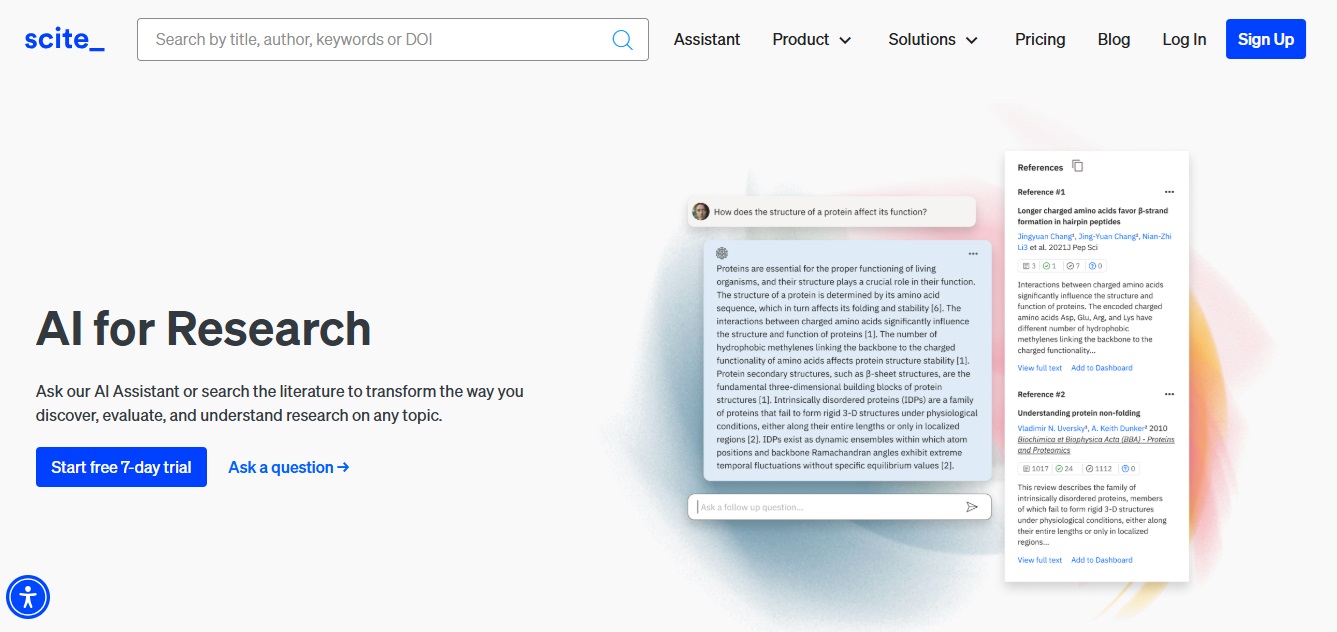Are you drowning in research papers, struggling to verify citations, and wishing for a research assistant who understands academic nuance? Then Scite AI might just be your lifeline. For weeks, I’ve been using Scite AI to streamline my research process, and I’m ready to share my honest experience – the triumphs, the tribulations, and whether it’s worth the investment. This in-depth review dives into everything you need to know about this powerful AI tool for researchers.
What is Scite AI?
Scite AI is a game-changing research tool designed to significantly improve the efficiency and accuracy of academic research. Imagine having a smart assistant that not only helps you find relevant papers but also instantly assesses the validity of citations – that’s the promise of Scite AI. It’s essentially a powerful search engine coupled with a citation verification engine and insightful analytics, all wrapped into one user-friendly (mostly!) interface. My experience has been a mix of awe-inspiring efficiency and occasional frustration, and I’ll detail both in this review.
How Does Scite AI Work?
Scite AI uses AI to analyze millions of research papers and their citations. It goes beyond simple keyword searches by understanding the context of citations and determining whether they support, contrast, or merely mention the claims in a given paper. This means you spend less time manually verifying sources and more time focusing on the actual research. The process is intuitive: You input your search terms or upload a paper, and Scite AI presents the results with clear, color-coded indicators showing the citation’s validity.
Key Features of Scite AI: A Deep Dive
Smart Citation: The Game Changer
This is undoubtedly Scite AI’s most impressive feature. The Smart Citation functionality quickly assesses the validity of citations, saving researchers countless hours of manual verification. The color-coded system (green for supporting, yellow for mentioning, and red for contrasting) instantly reveals the reliability of the source material. It’s truly a revolutionary approach to literature reviews.
Scite Assistant: Your AI Research Partner
Need quick answers to research questions? The Scite Assistant is a lifesaver. Pose your questions in plain English, and the Assistant provides well-researched answers, complete with proper citations. This is incredibly helpful for generating background information or quickly clarifying concepts. It’s like having a dedicated, highly knowledgeable research assistant readily available.
Scite Digest: Your Research Performance Dashboard
Think Spotify Wrapped, but for your academic output. Scite Digest provides a fascinating overview of your research habits, including the percentage of open-access articles you’ve cited, your self-citation rate, and your most frequently published journals. This feature offers valuable self-reflection opportunities and can help researchers track their progress and identify areas for improvement.
In-Depth Review: Strengths and Weaknesses
Strengths:
- Time Savings: The Smart Citation feature alone saves significant time and effort, allowing researchers to focus on higher-level tasks.
- Improved Accuracy: By verifying citations, Scite AI helps to ensure the accuracy and reliability of research.
- Enhanced Insights: The Scite Digest provides valuable self-reflection and performance tracking capabilities.
- User-Friendly (Mostly): While the interface requires a short learning curve, the core functions are relatively intuitive.
- Zotero Integration: This vital integration streamlines workflow for users already utilizing Zotero.
Weaknesses:
- Interface Clunkiness: The interface, while functional, could benefit from a more polished and streamlined design. Navigation could be improved for a smoother user experience.
- Limited Integrations: While Zotero integration exists, adding more compatibility with popular research tools like Mendeley would be beneficial.
- Pricing: The $20/month individual plan can be expensive for some researchers, especially those on tight budgets. However, the potential time savings might outweigh the cost for many.
Benefits of Using Scite AI
The key benefit is undeniably the significant time saved. This time can be redirected to more creative and in-depth research, leading to better-quality publications and more impactful contributions to the academic community. The increased accuracy and reliability of research findings also add substantial value.
Pricing and Plans
Currently, Scite AI offers an individual plan for $20 per month. While this cost might seem high, consider the potential return on investment in terms of time saved and increased research quality. A 7-day free trial is available, allowing researchers to assess the tool’s value before committing to a paid subscription.
Comparison with Other Tools
Important Considerations
Before subscribing, consider your specific research needs and budget. The free trial is crucial for determining if Scite AI aligns with your workflow.
Conclusion: Is Scite AI Worth It?
If you’re looking to enhance your research workflow and leverage the power of AI in your academic endeavors, we encourage you to try Scite AI. At FEC, we’re passionate about helping businesses leverage technology to achieve their goals. We offer training and support on integrating AI tools into digital marketing strategies, including affiliate marketing, Google Ads, and SEO – all designed to boost your online presence and increase your return on investment. Contact us today to learn more about how FEC can help you harness the power of AI for your success.
